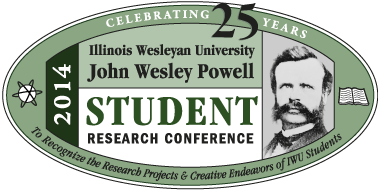“The Long Road to Exciting Results: New Discoveries in DNA Charge Transport.”
Submission Type
Event
Expected Graduation Date
2014
Location
Young Main Lounge, Memorial Center, Illinois Wesleyan University
Start Date
4-12-2014 12:15 PM
End Date
4-12-2014 1:00 PM
Abstract
As a researcher at Wake Forest University, Paul Black’s training crosses physics, biology, and chemistry, focusing on radiation chemistry. Black attended the College of William and Mary from 2003-2007 and earned a Bachelor of Science degree, with honors, majoring in Physics. At William and Mary he pursued honors research in magnetic resonance under the supervision of Professor Todd Averett. After graduating from William and Mary, he began his graduate education at the University of Rochester in the summer of 2007. He pursued research in ionizing radiation damage to DNA and protein, using magnetic resonance techniques to characterize free radicals in organic molecules under the supervision of Professor William Bernhard. He received his Master of Science degree in Biophysics from the University of Rochester in March, 2009. The author has been invited to speak at five separate conferences, with subjects ranging from DNA nano-filtration to charge transport properties of DNA to the possible influence of ionizing radiation on the origin of life on Earth. He has received multiple travel awards to attend conferences both within the United States and abroad. In 2007, he received the University of Rochester’s Deans Award. In 2011, the author received the William F. Neuman Award and was awarded the Neuman Biophysics Travel Grant to attend the International Congress of Radiation Research meeting in Warsaw, Poland. He was the Biophysics and Structural Biology student representative from 2009 to 2010 and was on the organizing committee for the BSB retreat in 2010. In addition, the author has served as a session chair at the Radiation Research Society meeting in 2010. He had the honor of serving as the chair of the Gordon Research Seminar on Radiation Chemistry in July, 2012.
“The Long Road to Exciting Results: New Discoveries in DNA Charge Transport.”
Young Main Lounge, Memorial Center, Illinois Wesleyan University
As a researcher at Wake Forest University, Paul Black’s training crosses physics, biology, and chemistry, focusing on radiation chemistry. Black attended the College of William and Mary from 2003-2007 and earned a Bachelor of Science degree, with honors, majoring in Physics. At William and Mary he pursued honors research in magnetic resonance under the supervision of Professor Todd Averett. After graduating from William and Mary, he began his graduate education at the University of Rochester in the summer of 2007. He pursued research in ionizing radiation damage to DNA and protein, using magnetic resonance techniques to characterize free radicals in organic molecules under the supervision of Professor William Bernhard. He received his Master of Science degree in Biophysics from the University of Rochester in March, 2009. The author has been invited to speak at five separate conferences, with subjects ranging from DNA nano-filtration to charge transport properties of DNA to the possible influence of ionizing radiation on the origin of life on Earth. He has received multiple travel awards to attend conferences both within the United States and abroad. In 2007, he received the University of Rochester’s Deans Award. In 2011, the author received the William F. Neuman Award and was awarded the Neuman Biophysics Travel Grant to attend the International Congress of Radiation Research meeting in Warsaw, Poland. He was the Biophysics and Structural Biology student representative from 2009 to 2010 and was on the organizing committee for the BSB retreat in 2010. In addition, the author has served as a session chair at the Radiation Research Society meeting in 2010. He had the honor of serving as the chair of the Gordon Research Seminar on Radiation Chemistry in July, 2012.


